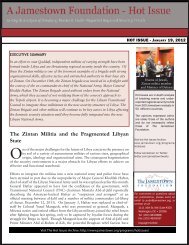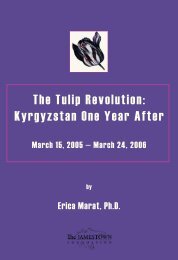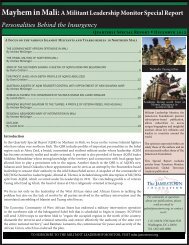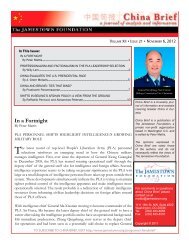By Brian Glyn Williams - The Jamestown Foundation
By Brian Glyn Williams - The Jamestown Foundation
By Brian Glyn Williams - The Jamestown Foundation
Create successful ePaper yourself
Turn your PDF publications into a flip-book with our unique Google optimized e-Paper software.
profitable for the Tatars who were constantly in search of new fields of plunder. <strong>The</strong> Persians appeared<br />
sufficiently weakened at this time to allow the Tatars to acquire sufficient booty to make a campaign in this<br />
direction lucrative. <strong>The</strong> Tatars may have also been inspired by a genuine religious zeal to partake in a<br />
campaign against the heretic Shiite Persians who were considered a threat to the Sunni Islam of both<br />
the Ottomans and the Crimean Tatars.<br />
<strong>The</strong>se reasons aside, an analysis of their role in this campaign should provide an accurate picture of the typical<br />
role played by the Tatars on this front as well as demonstrate the tactics used by the Khan's forces against the<br />
Safavids.<br />
<strong>The</strong> Ottomans chose to invade Persia's Caucasus provinces in 1578 expecting to take advantage of Persian<br />
disunity. <strong>The</strong> Safavids were in the process of recovering from the effects of a bloody civil war and appeared<br />
to be too divided to resist a strong Ottoman thrust into their northern territories.<br />
<strong>The</strong> Ottoman government also had great faith in the ability of the Serdar (General) chosen to lead the<br />
offensive. <strong>The</strong> man chosen for the task, Mehemed Pasha, was an experienced campaigner who had<br />
fought in the Caucasus previously and knew the area and its people well. Mehemed was well aware of<br />
the fierce nature of the Caucasian peoples and expected as much trouble from them as he did from the Safavids<br />
who exerted varying degrees of control over many of the region's tribes and principalities. It is therefore not<br />
surprising that he called on the Tatars to assist his forces at the beginning of the Ottoman offensive in April of<br />
1578.<br />
As was so often the case, the Tatars were involved in problems of their own and were initially unable to<br />
assist the Ottoman forces. <strong>The</strong> Tatars were preoccupied with operations against Poland, which had been<br />
unable to prevent Cossacks in her lands from raiding Crimean territory. It was not until September that<br />
the Grand Vezir succeeded in arranging a truce between the Poles and the Crimean Tatars, thus permitting<br />
the Tatars to come to the Ottomans' aid.<br />
Meanwhile, the Ottoman army had commenced an assault on Persian-held Georgia, and in the battles of<br />
Childir and Alazan Mehemed Pasha succeeded in defeating the numerically superior Persian forces arrayed<br />
against him. <strong>By</strong> the end of the campaign season, the Ottomans had gained a tenuous control of much of<br />
Georgia and Shirvan. As Mehemed Pasha prepared to withdraw his army, he once again called on the<br />
Tatars for assistance. <strong>The</strong> Khan's forces were needed to bolster the relatively weak occupying force of<br />
8,000 men, which had been left to hold the Empire's new possessions for the winter.<br />
It was not until the middle of October that a Tatar detachment of 15,000 men, under the command of Adil<br />
Giray, the Kalgay (heir to the throne), departed for the battlefront in Transcaucasia. <strong>The</strong>re was a sense of<br />
urgency surrounding the Tatars' journey south, for a Safavid army of roughly the same size had also<br />
begun moving toward the Ottoman force, which was stationed in the city of Aresh.<br />
<strong>The</strong> Safavid forces, under the leadership of one Aras Khan, arrived first and quickly commenced an<br />
assault on the outnumbered Ottomans who resisted bravely for three days. On the third day, it appeared that<br />
the Ottoman defenses were close to crumbling when a messenger arrived to inform the disheartened<br />
troops that the Tatar contingent was only a station away.<br />
Upon hearing this news, the Ottoman defenders rallied their strength and held out until the Tatars arrived<br />
later that day. In describing the ensuing battle, Kortepeter relates that the hardy Tatars quickly engaged the<br />
10
















